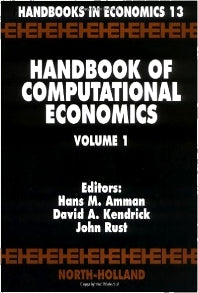Freshly Printed - allow 10 days lead
Couldn't load pickup availability
Handbook of Computational Economics
H.M. Amman (Edited by), D.A. Kendrick (Edited by), J. Rust (Edited by)
9780444898579, Elsevier Science
Hardback, published 13 June 1996
840 pages
24.4 x 17.5 x 4.2 cm, 1.6 kg
"This Handbook is a solid piece of evidence of the extent of the application of computational methods in contemporary economic research and of the actual speed and strength with which this emerging field of economics is developing. ... this book on computational economics offers a remarkable picture of the very recent development of economics as a science as well as an exciting preview of its potential achievements in the near future." --Mathematical Reviews
The aim of this volume is to provide an introduction and selective overview of the rapidly emerging field of computational economics. Computational economics provides an important set of tools that an increasing number of economists will need to acquire in order to understand and do state-of-the-art research in virtually all areas of economics. Articles in the volume range from very applied, policy oriented applications of computational methods, to highly theoretical and mathematically complex analyses of algorithms and numerical methods. The book emphasizes the unique contributions of computational methods in economics, and focuses on problems for which well developed solutions are not already available from the literature in operations research, numerical methods, and computer science. As well as covering relatively mature areas in the field, a number of chapters are included which cover more speculative "frontier topics", in particular recently discovered computational innovations and research results. For more information on the Handbooks in Economics series, please see our homepage on
Preface. Economic Topics. Computable general equilibrium modelling for policy analysis and forecasting (P.B. Dixon, B.R. Parmenter). Computation of equilibria in finite games (R.D. McKelvey, A. McLennan). Computational methods for macroeconomic models (R.C. Fair). Mechanics of forming and estimating dynamic linear economies (E.W. Andersen et al.). Nonlinear pricing and mechanism design (R. Wilson). Sectoral economics (D.A. Kendrick). Computer Science Parallel computation (A. Nagurney). Artificial intelligence in economics and finance: A state of the art - 1994 (L.F. Pau, P.-Y. Tan). Neural networks for encoding and adapting in dynamic economies (I.-K. Cho, T.J. Sargent). Modelling languages in computational economics: GAMS (S.A. Zenios). Numerical Methods. Mathematica for economists (H. Varian). Approximation, perturbation, and projection methods in economic analysis (K.L. Judd). Numerical methods for linear-quadratic models (H.M. Amman). Numerical dynamic programming in economics (J. Rust). Monte Carlo simulation and numerical integration (J. Geweke).
Subject Areas: Computer science [UY], Business mathematics & systems [KJQ], Economics [KC]


